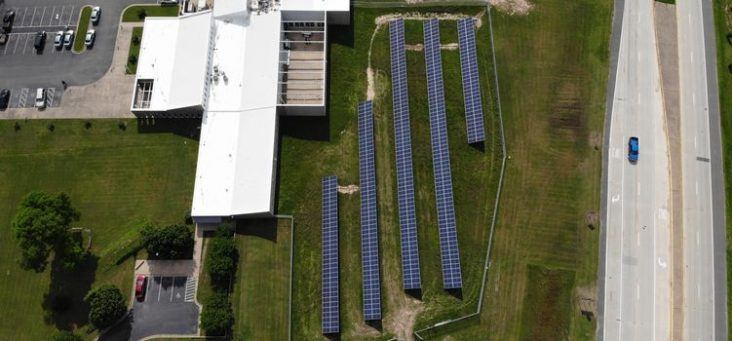Seal Solar co-founder Heather Nelson explains shift to solar design and installations
by June 13, 2019 10:01 pm 1,853 views

Seal Energy Solutions, now Seal Solar, officially opened a new headquarters in Argenta last week. The Arkansas-based company, founded in 2012 by Josh Davenport and Heather Nelson, is focusing exclusively on solar design and installation, part of a partnership with LightWave Solar. The new focus centers on larger solar power generation projects for Arkansas farmers, businesses and municipalities.
In April, Seal Solar sold its heating and air unit to Smart Comfort of Little Rock and its energy efficiency unit to Custom Insulation and Supply Inc. of Hot Springs. Talk Business & Politics CEO Roby Brock interviewed Nelson, whose current title is co-founder and chief dream officer, to learn more about the company’s future.
Roby Brock: What motivated you to shed your other two units and move strictly to solar installations?
Heather Nelson: It was the right combination of timing and opportunity. Since 2015, my business partner, Josh Davenport, and I have been heavily involved in the legislative side of our state’s solar industry. During this time, we saw the growth of our solar division skyrocket — eclipsing other lines of business three-to-one. Then last year, we formed a teaming agreement with LightWave Solar, a like-minded, nationally recognized firm out of Nashville, Tennessee, to take on even larger-scale solar design and installation projects here in Arkansas. These factors, along with recent state policy changes, solidified our decision to focus purely on solar.
Brock: What has changed with solar to make it so attractive as a pure-play business for you?
 Nelson: When we started Seal Solar, we never imagined how quickly the industry would grow. Today, the price of solar has significantly decreased. Its low cost, along with the 30 percent solar Investment Tax Credit (ITC), makes it a strong investment, whether our clients are homeowners, farmers, municipalities or businesses.
Nelson: When we started Seal Solar, we never imagined how quickly the industry would grow. Today, the price of solar has significantly decreased. Its low cost, along with the 30 percent solar Investment Tax Credit (ITC), makes it a strong investment, whether our clients are homeowners, farmers, municipalities or businesses.
Brock: The tax credit could expire at the end of this year. Do you want it to continue, will it impact business if it goes away? Why or why not?
Nelson: The U.S. government has extended the expiration date of the solar ITC twice before, most recently in 2016 with a gradual “step down” schedule. At the end of 2019, the credit is set to go from 30 to 26 percent. It will decrease to 22 percent in 2021 and then again in 2022 to 10 percent. As of now, there’s been no indication of another extension. Ideally, we’ll see Arkansas implement a state tax incentive at some point. While it’s hard to gauge how much the step down will affect the industry, we have seen an uptick in the number of Arkansans who want to take advantage of the 30 percent ITC rate before it expires. Regardless, our team has made it a priority to know the ins and outs of every available tax credit so we can provide clients with the most cost-effective options possible.
Brock: Do you envision that you will stay in this solar installation space or do you see other growth avenues in solar for the company?
Nelson: Right now, the solar penetration rate in Arkansas is less than half of one percent. We believe there’s unlimited growth potential in the solar design and installation space, including in solar battery storage.
Brock: How big, how much growth do you prefer for Seal Solar? Is this a future public company, a potential franchise opportunity around the country, or a private business poised to grow steadily? What’s your aspiration for the future?
Nelson: Every year, our growth surprises us. Already we have operated in two emerging industries: energy efficiency and solar. In solar alone, our firm has designed and installed one of every five arrays in the state. Looking ahead, we want to ensure we hold onto this market share and grow it. But we also want to remain focused on keeping our clients at the center of our work, investing in our team and continually exceeding expectations.
